Food aid soon will run out for nearly a million South Sudanese sheltering in Uganda in what has become the world's fastest-growing refugee crisis, the United Nations refugee chief said Friday.
"Disturbing shortfalls are emerging in critical areas such as food, shelter and education," Filippo Grandi told a global summit seeking $8 billion for the crisis over the next four years. "Malnutrition rates among refugees are alarming. The World Food Program told us yesterday that the food pipeline here in Uganda will dry up soon."
The East African nation now hosts 950,000 people from South Sudan. Most have arrived in the past year. Officials say host communities are near the breaking point.
Already, food rations have been cut in half for some refugees.
Uganda last year received three times more refugees from South Sudan than the number of migrants crossing the central Mediterranean, U.N. Secretary-General Antonio Guterres has said.
Guterres on Friday called the refugee influx "the biggest exodus of refugees in Africa since the Rwanda genocide" of 1994. He has urged South Sudan's leaders to end the civil war in which tens of thousands of people have been killed since late 2013. More than 1.8 million people have fled into neighboring countries.
The U.N. chief also made a plea for protection of refugees around the world, saying some richer countries haven't been as tolerant as some in Africa.
"I have seen the hearts of Ugandan people open, but not all doors are open in the world. Not all refugees are accepted. Some are rejected, and sometimes the country is much richer than Uganda," the U.N. chief said. Uganda has been praised for its generous policy toward refugees, including the allocation of plots of land for growing food.
But Grandi, the refugee chief, said that "regrettably, the hospitality of host countries is not adequately matched by financial contributions" from the international community.
The U.N. children's fund in Uganda this week said it requires nearly $50 million this year as well as $30 million each year from 2018 to 2020 to provide critical services to both refugees and host communities.




